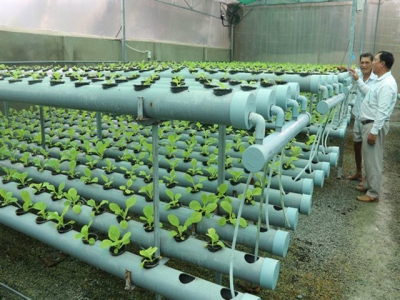Restructuring helps form three key categories of agricultural products

The Mekong Delta province of Tiền Giang has widely applied science and technology, expanded new economic models into agricultural production, helping create high quality agricultural products to meet market demand, and bring economic benefits to farmers. Agricultural restructuring based on key product categories and the flexible priority given to the categories had created major changes for agricultural production. — VNA/VNS Photo Minh Trí
HÀ NỘI — One of the main achievements of Việt Nam’s agricultural restructuring plan over the last five years is the formation of three product categories – national key products, local key products and those under the programme “one village, one product”.
National key agricultural products are those with an export value of at least US$1 billion each. Local key products are those that make up a major proportion of agricultural production and have great potential for expansion and technological application. The “one village, one product” programme focuses on special local products to ensure they are preserved and promoted.
Agriculture expert Hoàng Trọng Thủy said the agricultural restructuring based on key product categories and the flexible priority given to the categories had created major changes for agricultural production.
In the past, Việt Nam gave priority to rice production, followed by aquaculture products, fruit and vegetables.
Now, seeing the drop in rice prices, the country had changed its priority to aquaculture, fruit and vegetables.
“The change helped generate the export value of fruit and vegetables last year to $3.45 billion with a year-on-year increase of 40.5 per cent,” Thủy said, adding that for the first time, Việt Nam’s fruit and vegetable export value had exceeded crude oil.
Minister of Agriculture and Rural Development Nguyễn Xuân Cường said that during the restructuring process, localities nationwide had turned disadvantages into advantages.
For example, the northern province of Sơn La had shifted from rice to longan, mango and citrus trees in mountainous areas.
In the southern province of Tây Ninh where weather conditions are unfavourable for farming, local authorities advised enterprises to study and invest in production areas as well as food processing plants.
Cường said that one of the positive results of restructuring was that more attention had been paid to post-harvest processing.
This year, ten processing plants had been built across the country.
However, according to experts, restructuring remained slow and was not ready for climate and market changes. For example, many localities had not identified key products and farmers preferred growing goods en-mass without considering about local planning or market demand.
Thủy said despite the fact the country’s agricultural production had grown, it still faced challenges including complicated market changes and modest market forecasting ability.
These challenges resulted in falling prices or oversupply of farming products, which negatively affects farmers’ businesses and incomes, Thủy said.
He also said that technological applications in agricultural production/ processing and storage were limited.
Việt Nam farm food goes worldwide
In 2013, the then Prime Minister Nguyễn Tấn Dũng approved a project on agricultural restructuring to raise added value and sustainable development.
Vietnamese farm produce is available in 180 countries and territories across the world. Farm produce has brought the country US$157.49 billion in the five-year period.
Last year, Việt Nam earned $36.37 billion thanks to exporting farm produce including $8.32 billion from aquaculture products and $3.45 billion from fruit and vegetables.
Export value in the first quarter of this year hit $8.7 billion, a year-over-year increase of 9.6 per cent. Việt Nam expects to gain $40-40.5 billion from farm produce exports this year.
Related news
 Agriculture must remove the barriers in land accumulation for 'taking off'
Agriculture must remove the barriers in land accumulation for 'taking off' Despite great efforts and changes, until now the land accumulation, creating momentum for the development of high-tech agriculture
 Hanoi wishes for Israel’s cooperation in hi-tech farming
Hanoi wishes for Israel’s cooperation in hi-tech farming Hanoi wants Israeli firms who always pioneer in applying science and technology in agricultural production to cooperate with support the city in hi-tech farming
 Pyrolysis technology improves coffee quality
Pyrolysis technology improves coffee quality The pyrolysis technology applied in coffee production in the Central Highland province of Dak Lak has shown efficiency in reducing greenhouse gas emission